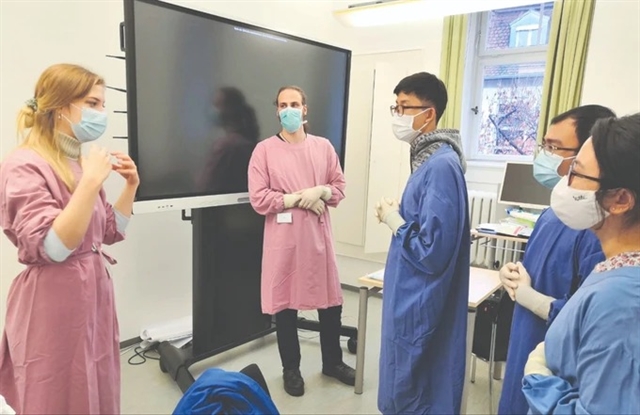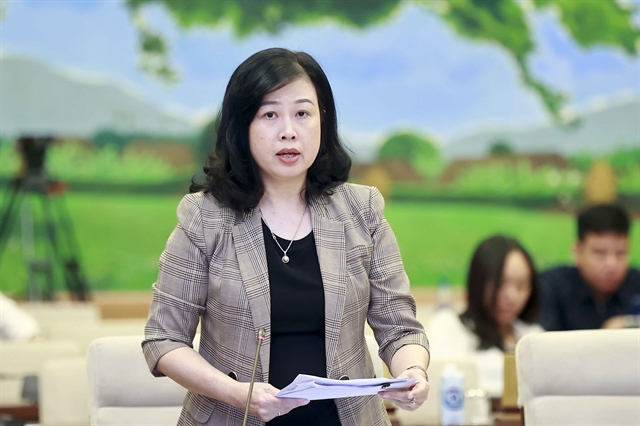 Society
Society

 |
| Minister of Health Đào Hồng Lan. — VNA/VNS Photo |
Despite encountering numerous challenges, the health sector successfully met targets set by the National Assembly and the Government last year. On the occasion of the 69th anniversary of Vietnamese Physician's Day (February 27, 1955 - February 27, 2024), Minister of Health Đào Hồng Lan talks to Sài Gòn Giải Phóng (Liberated Sài Gòn) newspaper regarding future priorities.
Reflecting on the accomplishments of 2023, the health sector has made significant strides. Could you elaborate further on these achievements?
With the unwavering attention, leadership and guidance of the Party and State, coupled with the collaborative efforts of ministries, sectors and local administrations, alongside the invaluable support of the populace and the steadfast dedication of our medical personnel, the health sector surmounted myriad challenges last year.
We successfully fulfiled pivotal objectives, making a proactive contribution to the nation's overall prosperity. Notably, the health sector surpassed three out of three key socio-economic targets stipulated by the National Assembly: achieving a ratio of 12.5 doctors per 10,000 individuals, 32 hospital beds per 10,000 individuals, and ensuring 93.2 per cent of the population's enrolment in health insurance schemes. Furthermore, we achieved and exceeded seven out of nine specific targets delineated by the Government for our industry and related fields.
Of particular significance, our ongoing efforts in controlling various infectious diseases, notably the COVID-19 pandemic, have yielded positive outcomes. As of October 20, 2023, the COVID-19 pandemic transitioned from a Group A to a Group B infectious disease, indicative of our effective containment measures. Additionally, there has been a heightened focus on preventing non-communicable diseases, underscoring our commitment to safeguarding and enhancing the well-being of our citizens.
In terms of medical examination and treatment endeavours, the entire sector has diligently pursued the synchronous implementation of measures aimed at enhancing the quality of healthcare services for the populace. Efforts have been concentrated on promoting initiatives such as satellite hospital projects, fostering the role of family doctors, and facilitating remote medical consultations and treatments. The dissemination of advanced medical techniques to lower-tier healthcare facilities has alleviated the burden on higher-level hospitals. Evaluation results have underscored a commendable satisfaction rate among the populace, exceeding 90 per cent.
Furthermore, the Ministry of Health has prioritised the refinement and establishment of various mechanisms and policies to gradually address deficiencies in the procurement of pharmaceuticals, medical supplies, and vaccines. Initiatives have been undertaken to establish a mechanism for reimbursing medical expenses and to create a legal framework conducive to the regulation of medical activities as required.
Collaborative efforts with Việt Nam Social Insurance have been pivotal in rectifying issues pertaining to health insurance reimbursements for medical services, while bolstering the roles and responsibilities of relevant ministries, agencies, and healthcare facilities in effectively managing and utilising the Health Insurance Fund.
What main and specific solutions have resulted from the outcomes?
The Ministry of Health has spearheaded a series of main and specific solutions. First of all, we've directed comprehensive actions to guide and support the removal of obstacles in disease prevention and policy regimes. This includes addressing shortages in drugs and medical equipment promptly and exchanging recommendations from localities, medical facilities and stakeholders nationwide. We've also promoted decentralisation in State health management, empowering local authorities and healthcare facilities to proactively resolve issues.
Our focus has also been placed on institutional reforms - including building, amending, and refining institutional frameworks, including the submission of the Law on Medical Examination and Treatment to the National Assembly.
We've also reviewed and amended legal documents to address industry-specific challenges, such as regulations related to health insurance and pharmaceuticals. These efforts have helped resolve shortages in drugs, supplies, and medical equipment, ensuring vaccine availability and streamlining payment mechanisms for medical expenses covered by health insurance.
Despite the plethora of mechanisms and policies in place, the health sector still grapples with numerous difficulties and challenges. Could you elaborate on these challenges and shed light on the development directions for the sector in the future?
Alongside the commendable achievements, the health sector faces a spectrum of shortcomings and limitations rooted in both subjective and objective factors. The burgeoning healthcare needs of the populace are increasingly diverse, coupled with evolving disease patterns, rapid population aging and the palpable impacts of climate change on public health.
Despite active efforts in constructing a legal framework, gaps remain, necessitating ongoing refinement. Certain medical facilities fall short in terms of management quality, administration, and patient service, failing to meet requisite standards. Domestically, the pharmaceutical and medical equipment manufacturing industries remain constrained. Additionally, there are persistent deficiencies in preferential policies for health sector officials, employees, and workers.
What is the future focus?
The health sector will prioritise several key areas. First and foremost, enhancing Preventive Healthcare Capacity is paramount. Focus will be on bolstering the preventive health system to effectively respond to emergencies and public health crises, safeguarding health security and food safety. This will be followed by a concentrated effort in Strengthening Grassroots Healthcare through innovative approaches to fortify grassroots healthcare, striving towards achieving universal health coverage.
Efforts will be directed towards improving medical services, with an emphasis on enhancing the quality of medical examination and treatment to ensure patient satisfaction, alongside a concerted effort in implementing digital transformation initiatives within the health sector. Additionally, there will be a push to promote Research and Technology, particularly in vaccine, medicine and medical equipment production. Strengthening grassroots and preventive medicine will also be a focal point, with intensified efforts in consolidating, perfecting, and improving the quality of grassroots healthcare activities, as outlined in recent directives and resolutions.
The tasks set forth for 2024 and beyond are multifaceted. We are steadfast in our commitment to enhancing responsibility and determination across the entire sector. Medical personnel will continue to uphold solidarity, adhere to medical ethics, and demonstrate unwavering determination in the pursuit of our mission to care for and protect the health of our populace. The issuance of directives and resolutions by the Ministry of Health and the National Assembly underscores our dedication to advancing grassroots and preventive medicine, charting a new trajectory for development in these critical areas. — VNS




